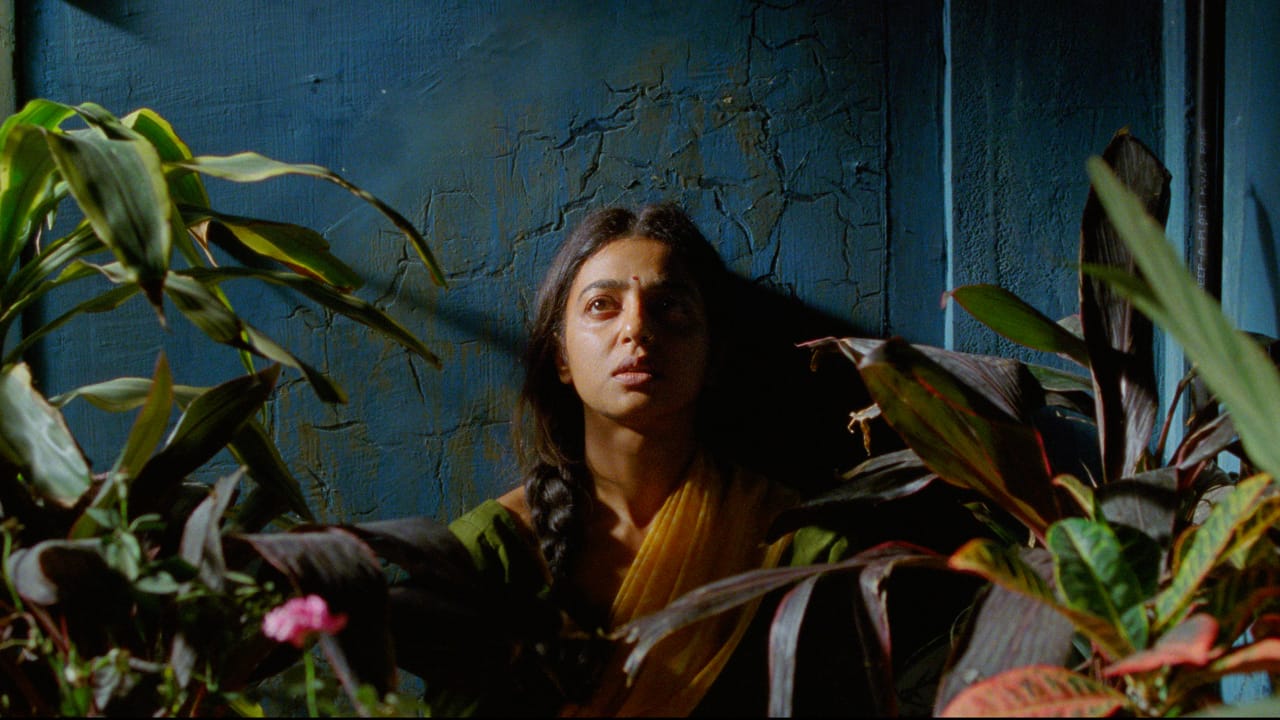Spoiler ahead!
“The evil that men do lives after them, the good is often interred with their bones.” Mark Antony’s quote in Julius Caesar is a testament to the fleeting nature of human memory; where a person’s worth is forgotten easily, but the ramifications of their actions continue to haunt the generations that come after them. It is the same reasoning behind the general public’s tendency to erect a national hero as their representative, and in the process, absolve themselves of their guilt.
Exhuma grapples with this very question: what is the meaning of creating a legacy?
Exhuma’s plot
Exhuma (2024) (Graveyard) is director Jang Jae-Hyun’s third film, after The Priests (2015) and Svaha: The Sixth Finger (2019). Jang operates within his chosen niche of occult horror; at first glance, Exhuma works within the same plot. Hwa-Rim, a shaman (Kim Go-Eun), and Bong-Gil (Lee Do-Hyun) get involved in the exhumation and reburial of a wealthy family’s grave, along with their friends and colleagues, a geomancer Kim Sang-Deok (Choi Min-Shik, of Oldboy fame) and Yeong-Geun, a mortician (Yoo Hae-Jin).
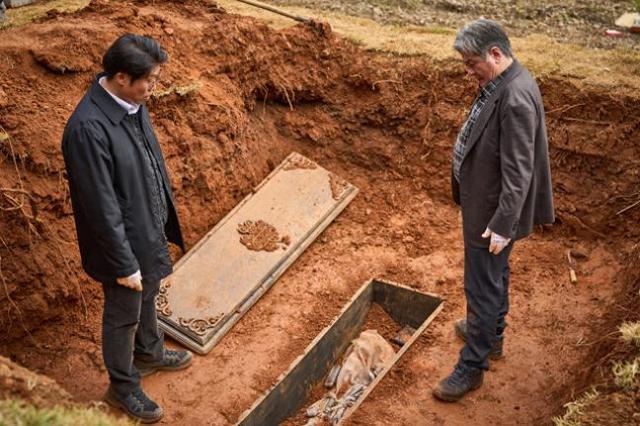
The quartet decides to exhume the body and bury it in another place, but they inadvertently stumble over a family secret. Jang’s credit lies in his new approach to the occult, bringing some much-needed change to the tried and tested dynamic. Choi Min-Shik and Yoo Hae-Jin play the jaded elders, in one of their introductory shots, Young-Geun pockets a gold chain from a grave, saying, “You shouldn’t leave metals behind, it is uncomfortable,” while exhuming a body.
The duo are cynical, aware of their position in life, and their declining importance in a society that no longer considers them to be consequential. Sang-Deok laments their shared misfortunes, “Look at you, selling yourself out to funeral homes, while I go snooping around construction sites. That is what we are. Last standing [paraphrased],” This line feels even more poignant coming from the mouth of Choi, who has been one of the most prolific actors in Korean cinema over the past decades.
Juxtaposed with the resigned cynicism of the elders, are Hwa-Rim and Bong-Gil, young shamans who are far more idealistic than their elders, if not more monetary. Money is the primary motivator for their actions; Hwa-Rim cracks a joke about the smell of money being too overpowering, Park Ji-Yong, the client, (played by a mildly insufferable Kim Jae-Cheol) coolly informs Sang-Deok that he should be the one asking the questions because he “is the one who is spending the money.”
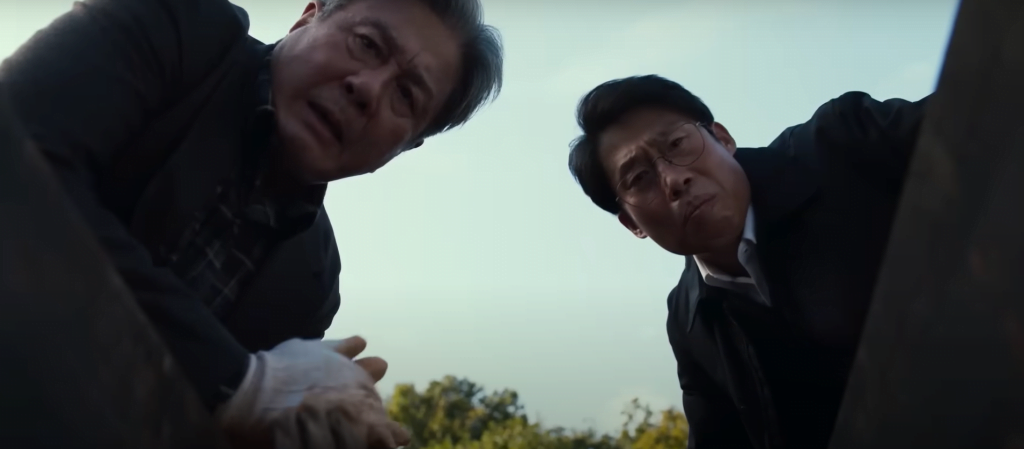
However, when push comes to shove, Hwa-Rim and Bong-Gil are also the ones who take the initiative, with Hwa-Rim sprinkling a border of glutinous rice around the exhumated tomb, asking for the blood of a white horse to be spread on it, for further protection. Looking at Young-Geun and Sang-Deok, both of whom are too terrified to move, she snaps, “You know this is nothing good.”
Bong-Gil sacrifices himself to save Hwa-Rim, leading to him becoming possessed by the vengeful spirit of a Japanese samurai. This apparent difference between the older generation and the newer, with Sang-Deok and Young-Geun choosing to be more calculated and hesitant in their actions, to Bong-Gil and Hwa-Rim, who jump headlong into oncoming danger—lead to the climax of the film, where Sang-Deok battles the spirit using his knowledge of geomancy.
The Good (the many, many, good)
Exhuma does not stray from the beaten path, despite the new spin that Jang plays on the occult genre. Jang’s niche is in horror: his previous film Svaha: The Sixth Finger dealt with elements of Maitreya Buddhism and Christianity, as did his first film, The Priests. Exhuma is decidedly Korean, and Jang shows this within the first five minutes of the film itself when an air hostess talks to Hwa-Rim in Japanese, she corrects them immediately, “I am Korean.”
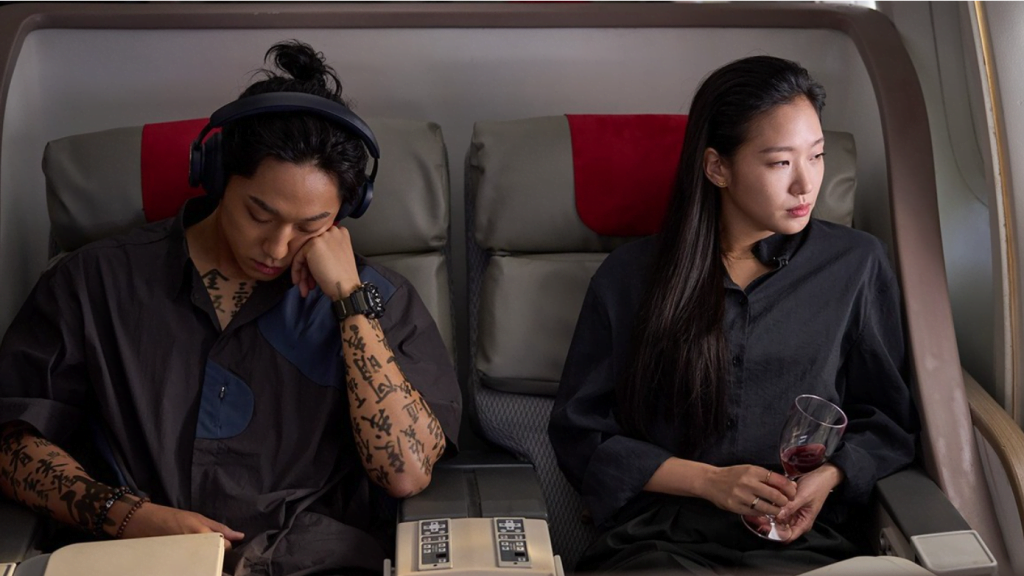
Without giving too much away, one can observe that the Korean national identity is the driving force behind this film, as well as its unfortunate colonised past. The trapped spirit of a Japanese samurai dreams of an Asia united under the banner of the Japanese kingdom, and upon awakening, he desires to carry out the work that had remained unfinished by the Japanese occupation.
The film’s tone remains uneasy throughout, amplified by the use of special effects and sound technology, which brought Kim Byung-In a Baeksang Arts Award for Technical Achievements. Lee Mo-Gae’s cinematography forces action in a tight space; the viewer feels similarly suffocated as the characters onscreen, deliciously eerie in moments, with the right amount of surrealism in it to make us confused about the truth.
Securing two of its four Baeksang Arts Award nominations, as well as the title of Best Director, it can be comfortably said that unarguably, the best part of Exhuma is its direction and its acting. Kim Go-Eun as Hwa-Rim is equal parts calculating and emotional, while Lee Do-Hyun as Bong-Gil acts as the heart and soul of the film; even while possessed, Lee has a commanding presence, one that allows him to share a screen with Kim, one of the finest actresses of her age, without becoming entirely overwhelmed. However, the standout performance from the cast is that of Choi Min-Shik, playing Sang-Deok, the aged geomancer. Sang-Deok’s motivations are simple enough for the audience to relate to him, he wants money to be able to spend on his daughter’s wedding.
Jang crafts characters that have been thought of as relics of a bygone age—geomancers, shamans, etc, and crafts them anew with a touch that renders them as fully-fledged characters onscreen, rather than two-dimensional characters that they were previously portrayed as. Even small details, such as Hwa-Rim putting on Converse shoes while preparing for a ritual, or Sang-Deok smoking an electronic cigarette, matter towards an honest portrayal.
The bad (the few instances of bad)
Exhuma is burdened with a screenplay that seems to take too many meandering turns to get to its final destination. While not necessarily unenjoyable, it does have its moments where it stumbles through, in its attempt to gather every loose end. It gets markedly slow towards the middle of the film when there is a lull in the action to make space for the final sequence of events, but I found my attention wavering.
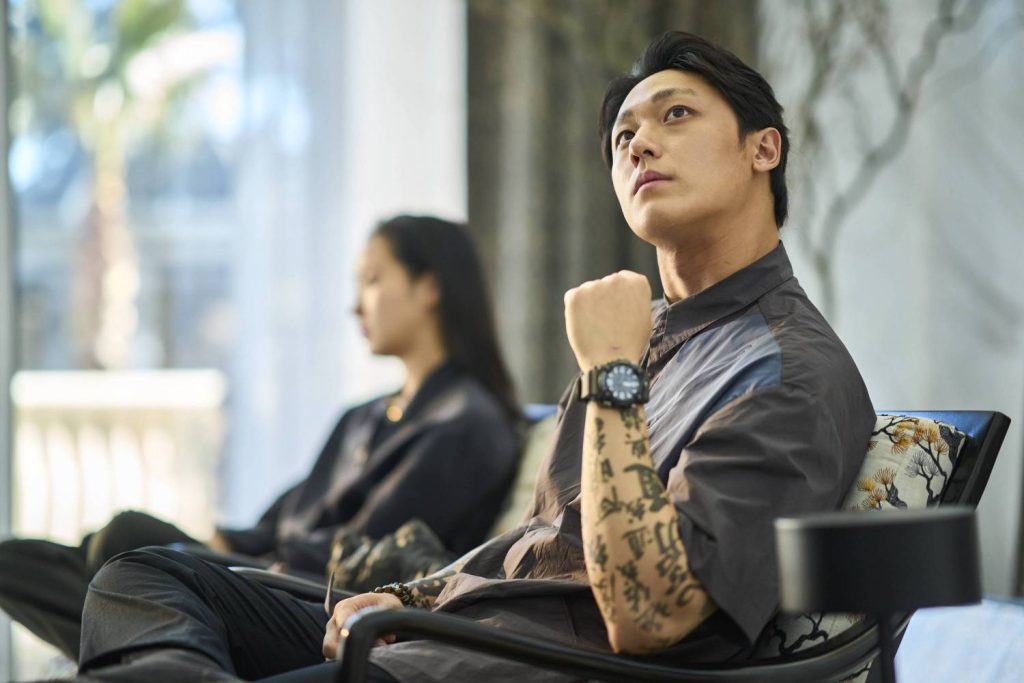
Whether that is a statement to be made of the film’s pace and sequence or my attention span, is yet to be decided. Additionally, Jang decides to keep expository shots to a minimum and gets rid of any pesky voice-overs that might distract the viewer from what happens on screen, but the rapid changes from Korean to Japanese shamanic practices only served to make me rather confused about its perceived differences and goals.
The concept of a legacy came to my mind when writing this review. Exhuma is a study of what history remembers—the bad deeds of men, which remain after they pass on, quite literally interred with their bones. The Park family is embarrassed and fearful of their family history, their legacy is not that of glorious freedom struggle, but pro-establishmentarian betrayal. Sang-Deok refers to the Park family patriarch as someone “famous for selling his country,” and implies that his fate after death was a result of his actions during his lifetime.
The term Chinilpa (친일파), or Builbae (부일배) refers to the people of the upper classes who betrayed Joseon (Korea) and collaborated with the colonisers. For the Park family, legacy is that of deep shame and guilt towards the very land that had raised them, and the land that their ancestor conspired to betray. For the four main characters, legacy means little; their concerns are more materialistic, and grounded in common sense. What is the need for a legacy when there are more pressing matters to be attended to, like that of one’s survival?
Final thoughts on Exhuma
Towards the final sequence, Hwa-Rim lures the spirit out to a tree, and disguises herself as a mountain spirit, dissatisfied with the presence of another spirit. When chased, she is backed into a corner, when a woman appears behind her, dressed in white, her hair in a neat bun, with a binyeo through it.
The presence of the woman is floating, but it is enough for the spirit to say (through Bong-Gil, who lies unconscious in a hospital bed), “damned old woman.” The presence of Hwa-Rim’s grandmother is palpable in crucial moments like these and lends solidity to Hwa-Rim’s character (someone carrying on the legacy of a shaman) which is absent from other characters.
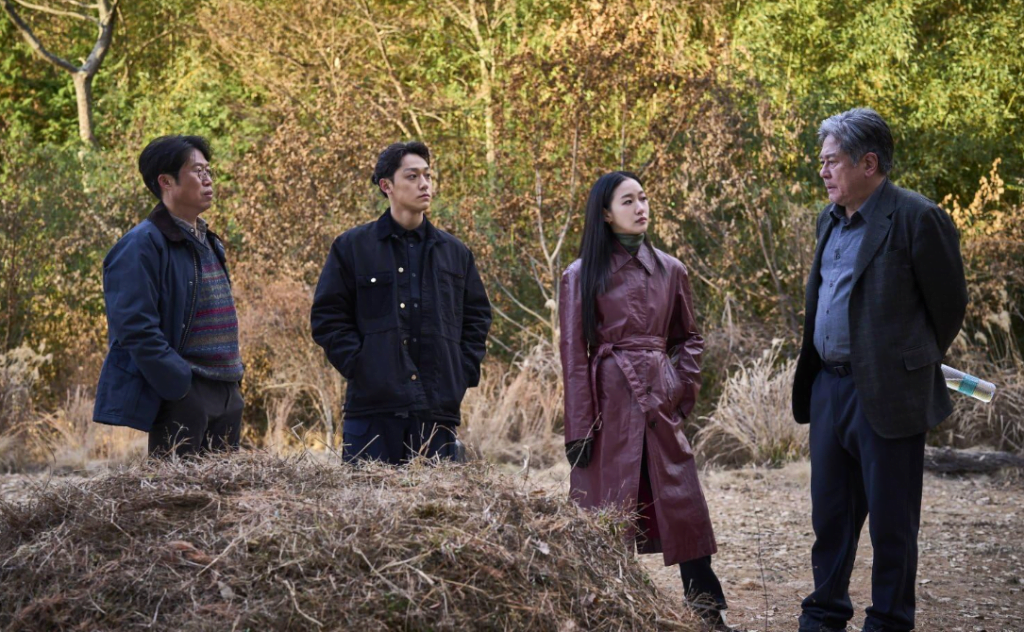
In the end, Exhuma is a film that struggles to break out from the formula that gave birth to it, and as a result, is perhaps more deeply self-conscious than most other occult horror films. It remains, however, as one of the more enjoyable and intelligent films released in the first quarter of the year, and as such, is a highly compelling watch, despite its apparent faults.




